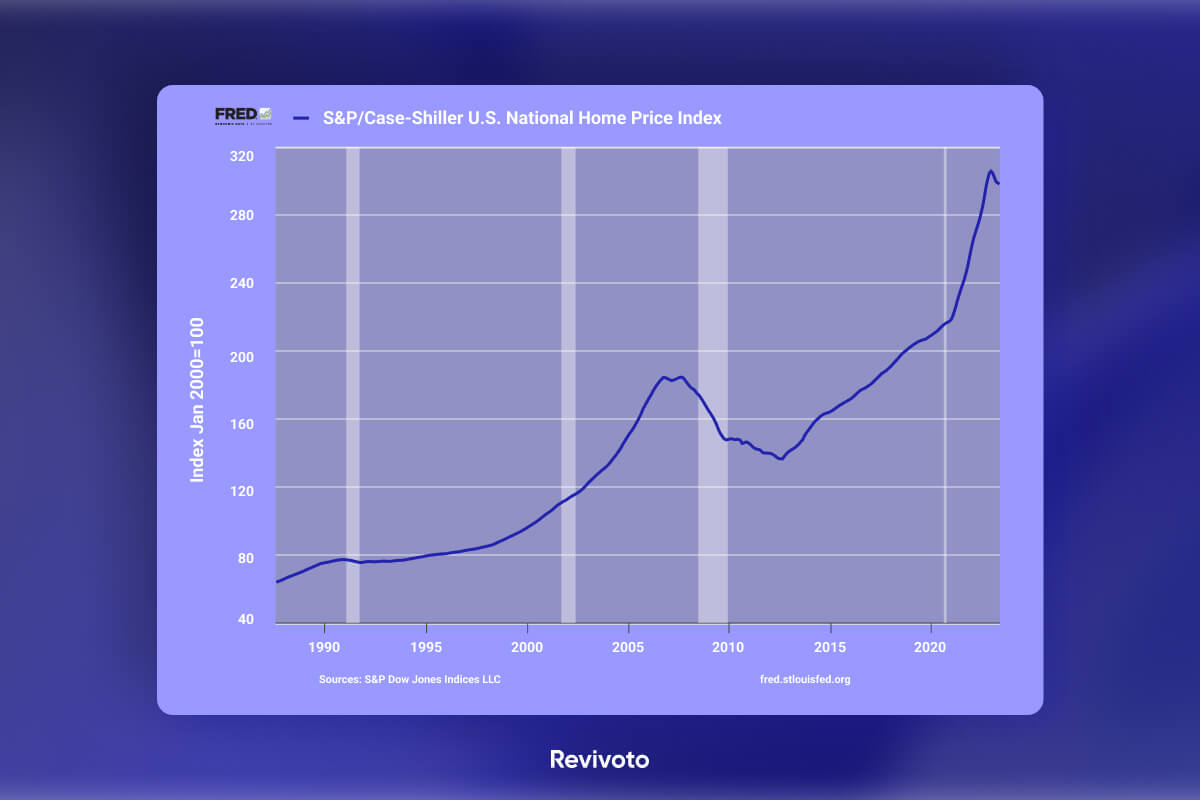“The early bird gets the worm, but the second mouse gets the cheese.”
Imagine a semi-dark room with a tint of red lighting; a fortune teller is sitting across the table from you, gazing into a foggy crystal ball to answer your query: when is the best time to buy a house? They finally respond with a mysterious voice: You shall buy a house when all the planets are aligned.
Well, we’re no clairvoyants, but we agree with this one: the best time to buy a house is, indeed when all the planets are aligned. And when it comes to purchasing your future home, those planets are called Personal, Seasonal, and Economical.
To assess this alignment, we will start with the planet you are more familiar with: The Personal. From there, we will continue our journey to the next two. But first, let’s talk about the main reason you went to the fortune teller: buying a house.
Table of Contents
The Decision-making process of Buying a House
People have different reasons for buying a house. According to the National Association of Realtors (NAR) report, they vary from the desire to own a home of own to better weather conditions. But no matter the motivation, it is a multi-dimensional decision affected by many factors. Generally, it is the largest and most durable purchase of one’s lifetime.
We acknowledge the challenges of this decision, which is why we want to show you what factors affect your purchase decision. Being aware of them gives you the power to control the ones you can.
Like any product purchase, there are multiple layers in play. One study on Consumer House Buying Behavior give has offered this model for the house-buying process:

Even a glimpse at this graph can show us we are faced with a complex decision, which is why many planets are involved. To unburden you, we will be by your side when you discover each of them.
Personal Aspects of Timing Your Homebuying
When it comes to the Personal planet, the financial aspects are the most significant structure staring at you. Like any planet, we have stuff happening on the surface and underneath:
1. Visible Personal Factors
These are mainly related to the parts you have to pay up and assessing whether you can afford to buy your house.
1.1. Financial status
This revolves around your credit and debts. To get a better mortgage deal, you must attend to this factor a priori. Sort out your student loans and credit card debts to make room for your dream home.
1.2. Job-status
unless you’re a cash buyer, you’ve got some years of mortgage payments ahead of you. Assess the security of your employment and see if you can count on it for the next step.
1.3. Homeownership costs
having your dream house is a package entailing expenses throughout the year. You need to know them to see if you’re financially prepared. They include:
- Upkeep and maintenance
- Utility costs
- Insurance
- Property tax
- Homeowner Association (HOA) fees
1.4. Down payment and closing costs
As a general rule, the bigger your down payment, the better the loan terms. Regarding the closing costs, they differ from one place to another but entail expenses like appraisal fees, taxes, and insurance. So, you need sizable savings to cover these costs.
How would you know that you have conquered the visible personal aspects? By getting pre-approved for a mortgage! Once you have dealt with the above, this would be your next step. There are various first-time homebuyer programs and grants that you can check out at this stage.
2. Invisible Personal Factors
There are hidden aspects of your decision that relate to your reason for buying a house. As we mentioned, there could be many motivations for such a decision, but you need to bring them to the surface. The best time to buy a house is affected by these hidden forces, whether we like it or not. So why not take charge of them?
2.1. Emotional aspects
The way to approach this part is by asking yourself some questions:
- Why am I doing this?
- Is this the right time for this decision? Why?
- Who will be affected by this decision, and to what extent?
- How would I feel after the process is finished?
2.2. Desires
This goes back to the image of your home and how it reflects your taste and even identity. Here, you get to decide what house features are essential for you and which are passable. Clarifying this will facilitate the house search process later.
2.3. Knowledge
making sure that you are familiar with the ups and downs of the process gives you confidence. Knowing all the necessary information can reduce your concerns about whether or not you’re making the right decision. So, do your research, consult friends and family who have recently bought their house, and consult a real estate agent. Simply put, cover your basis.
Once you’ve conquered the Personal aspects, you can move to the other two. Since it’s all about timing, let’s move on to the Seasonal Planet.
Seasonal Factors Affecting Homebuying
It can be hard to swallow that seasons play a role in the real estate market. It won’t be that hard if we take into account the research proving how temperature and precipitation can affect house prices. We will assess this thoroughly, but each season has its pros and cons in the real estate market; in an overview:
| Season | Advantages | Disadvantages |
| Spring | More Inventory Best presentation of the property Possibility of visiting the house as a family Settling before the new school year | Bidding wars Higher prices Fast offers |
| Summer | More Inventory Best presentation of the property Possibility of visiting the house as a family Settling before the new school year | Higher prices (lower close to the end of the season) Hot weather (in some areas) Fast offers |
| Fall | More willing and flexible Sellers More time to make an offer | Limited inventory Holiday season Undesirable weather conditions |
| Winter | More willing and flexible Sellers Faster Closing process Negotiable closing costs | Limited inventory Less appeal due to weather Harder inspection circumstances |
As it’s evident from the table, warmer seasons bring more people to the market on both sides. On the contrary, in colder seasons, we see a decline in the market. Let’s check these two patterns:
Real estate market in warm seasons (Spring and Summer)
As a pattern, starting the spring means more properties are in the market for sale. Due to this fluctuation in inventory, we have more buyers as well. All that results in the rise of prices and even bidding wars. When the market is competitive, you need to act fast and make an offer. Therefore, you’d have less time to assess and must move quickly.
There are many reasons why these warm months are more favored for house purchases. Some of them are:
- You can showcase a property better in agreeable weather conditions; take advantage of ample natural light and the greenery at its bloom. Both buyers and sellers benefit from this. However, this visual appeal may result in a rise in the asking price.
- These months are more suited for families with children. They can visit the property together when the school is closed and move before the new school year begins.
- The prediction of the housing market’s direction gets more precise, and both sides will have more information on which to base their decision.
Whatever the reason, the real estate market goes on a high starting spring and slows down as getting closer to the school year and cold weather. Late august can be a good window for buyers while the inventory is still satisfactory, yet sellers tend to lower their asking price.
Real estate market in cold seasons (Fall and Winter)
Starting in the fall, the market becomes more settled, and the decline in the number of houses for sale begins. At the same time, since there are fewer buyers, the asking prices are typically lower. Sellers may be more open to negotiation and add sweeteners to the deal.
Also, suppose you find a realtor who can work with dedication during the holiday season; In that case, you can close faster than in warm seasons. The process can be accelerated even more since there are fewer applications for loans.
There are causes for this change in the market, like:
- Sellers showing flexibility to finalize the deal before the new year to get a tax write-off.
- Weather conditions result in less pleasant scenery barring proper showcase of the house. It can also affect open houses, private showings, and the ability to visit or inspect the property in harsh conditions.
- With children at school, it can be harder to go for a showing altogether. Moving during the school year can also be challenging.
As you can see, deciding the best time for your house purchase on Planet Seasonal depends on your priorities. If you desire specific features or need more options to pick from, warmer seasons provide more choices. Nevertheless, you’d have to be ready for fierce competition and higher prices and act fast to make an offer.
If your requirements are flexible and you prefer a calmer market, you can opt for colder months. You may have fewer options, but other circumstances are more agreeable.
Closely monitoring the market of the area you’re interested in can give you an edge. You can also benefit from a local real estate agent who can assist you in timing and finding your dream house.
Economic Elements Influencing Homebuying
We have arrived at the big picture. Buying a house may be one of your personal decisions, but it is also an economic event. Because of that, economic factors impact your decision. The typical players are:
The interest rate
The Federal Open Market Committee (FOMC) sets the interest rate 8 times during the year. It indicates the rate commercial banks lend their reserves to one another overnight. It is determined based on the overall status of the economy, including factors like the inflation rate. It is essential because your mortgage rate is directly affected by it—higher interest rates result in a rise in mortgage rates.
Inventory
Refers to the number of houses and condominiums available in the market. Besides sellers’ decision to put their property on the market, the general policies regarding construction, permits, and restrictions affect the inventory. This economic indicator impacts the prices of the real estate market.
Trendy locations
The economy can sway the real estate market in specific areas. For instance, during the Covid 19 pandemic, Phoenix became one of the hot areas. Such changes in the market give rise to the prices, and if you’d have to relocate to such areas, you are bound by its effects.
Programs and grants
Depending on the national economic policies, governments alter the assisting programs for first-time or general homebuyers. These could be an effective incentive in deciding the right time to buy your house.
While it can be terrifying, being aware of the big picture can be illuminating. Take house prices in the US; when you look at the bigger picture, it shows you the trend instead of minor changes:
The Alignment: Best Time to Buy Your House
Now that you know what is happening on each of these planets, you can decide on your timing for purchasing a house. As we’ve demonstrated through this blog, home buying is a multi-dimensional decision. Therefore, picking the best time to buy a house must happen after you have determined all aspects.

Once you clarify where you stand on each planet, you can locate the converging point. That would be the best time to buy a house for you.
Final word
Pinpointing the best time to buy a house is challenging, and today’s intertwined economy does not make it easier. Is there going to be another depression? Will house prices fall in 2023? And many similar dilemmas that you’d have to face when buying your house. Fortunately, in a healthy economy, there are implemented safeguards to avoid drastic changes. So, when timing your homebuying, you’re the one deciding how to navigate amidst the planets. The bird and the mouse are both winners if they pick the right time.
FAQ
The final quarter of 2022 witnessed a firm decline in mortgage rates, ending the year at 6.42%. However, real estate market experts only estimate a rate above 5% in the second half of 2023.
After the catastrophe of 2008, the loaning regulation got more strict, and homeowners have reliable equity today. The upcoming changes are more leaning towards settling down and stabilizing the market to bring back what is missing: affordability.
If you are relocating to a new city or state and are forced to make a purchase, then the right time is what fits your needs. As for an investment option, here are the facts about the housing market leaving 2022 behind:
- The inventory is tight
- Mortgage rates are high
- If not pressured, sellers are reluctant to sell
- The prices are elevated
All this means you must approach the market intently and monitor all the changes in the region you are willing to invest in.


